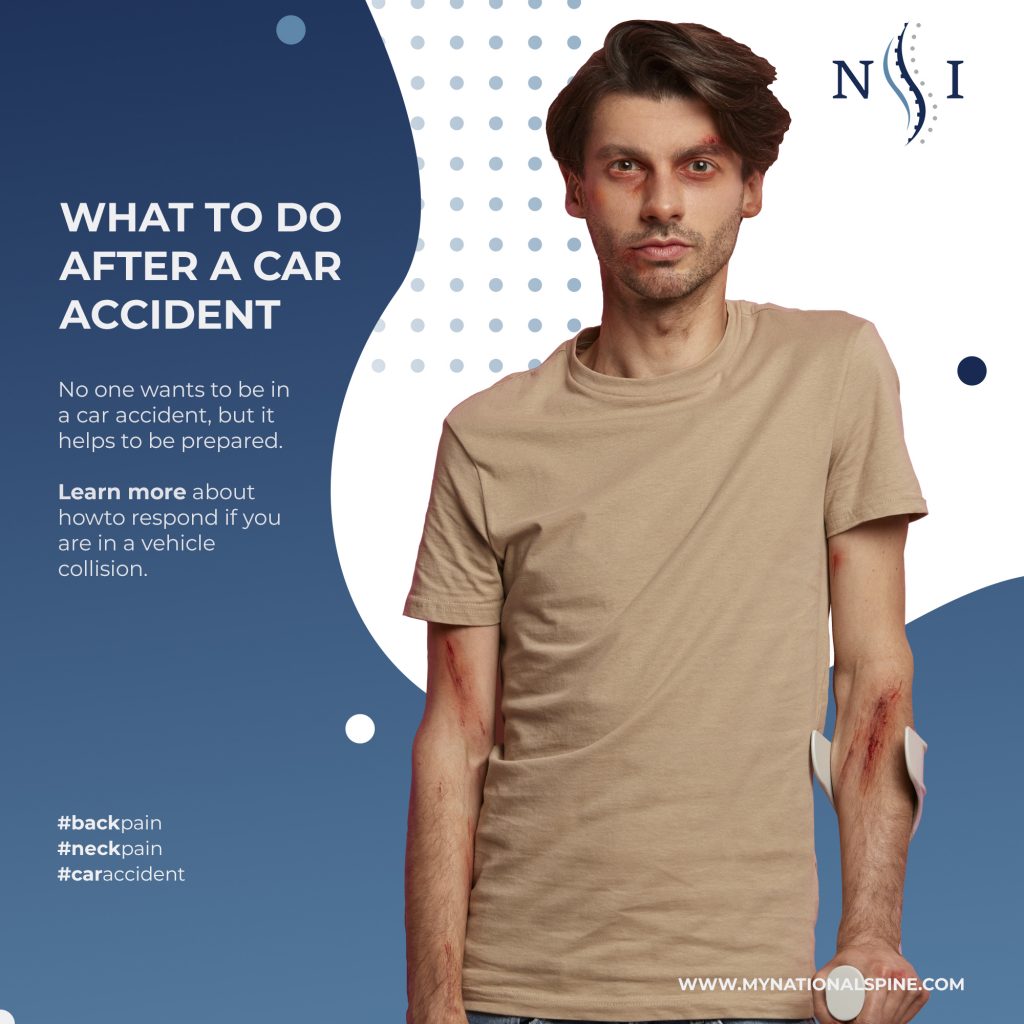What to do after a car accident


What to Do After a Car Accident
No one wants to be in a car accident. Even in the best cases, they can take up a lot of time and be very costly. In the most serious situations, automobile collisions can result in life-altering or even fatal injuries.
Millions of people are affected by car accidents however, so it’s important to be prepared and know what to do if you ever do find yourself in one. Responding calmly and quickly after a collision or other accident can help ensure the best possible outcome to the health and property of everyone involved.
Whether you just want to be ready, or you have recently been in an accident and want to ensure you haven’t missed anything, take some time to review this helpful guide. If you have any questions or would like to learn more about treatment options for personal injury, reach out to a representative at National Spine Institute.
Automobile accident facts
Car accidents represent not only a major health concern, but also a significant source of costly property damage. The World Health Organization (WHO) estimates that between 20 and 50 million people around the world suffer from some form of vehicular injury each year, with as many as 1.3 million fatalities.
What’s more, due to the cost of property damage and associated health care costs, car accident costs represent as much as 3% of many countries’ gross domestic product.
Although there is no way to fully prevent automobile accidents from occurring, preventive measures can reduce their likelihood and keep you and the people around you safe.
Practice safe driving
The number one thing anyone can do is practice safe driving habits every time they get into a vehicle. Here are some of the key steps to being a safe driver and preventing auto accidents:
- Regularly inspect your vehicle to ensure tires are inflated, lights and mirrors are operational and positioned correctly and windshield wipers are functional
- Ensure your vehicle receives regular manufacturer-recommended maintenance
- Always wear a seatbelt and require any passengers to do the same
- Secure any and all loose objects
- Never drive distracted or text while driving
- Follow any and all traffic laws and signs and practice defensive drivers
Always be prepared
Despite our best efforts, there are still many causes of car accidents that are beyond anyone’s control. To minimize the negative impact of a car accident, being as prepared as possible can help you respond quickly and calmly if you do find yourself affected by a motor vehicle collision in any way. Important accident-preparation steps that anyone should take include:
- Making sure your mobile phone is fully charged and operational, especially before longer trips
- Having your drivers’ license, vehicle registration and insurance documentation accessible and ready
- Packing an accident preparation and safety kit that includes a first aid kit, a flashlight, roadside flares, water, non perishable foods and other essentials
- Having emergency contact information and insurance contact information ready to go
Do not leave the scene of the accident
If you ever find yourself in a car accident, never leave the scene. No matter how minor the collision or who appears to be at fault, there can be significant health, cost and legal implications to leaving the scene of an accident.
After a motor vehicle collision of any kind, the number one priority is to assess any injury or damage and report any necessary information to the authorities and insurance companies. This requires everyone to stay at the scene of the accident.
Find out if you or anyone else is hurt
After a car accident, safety is the number one concern. First, check yourself for any immediate injuries. Next, find out if any passengers in your car are hurt.
If you are safely able to, determine if anyone at the scene of the accident requires emergency medical attention.
Do what you can to get you and your vehicle to safety
Next, if it is possible, pull your vehicle to the side of the road and out of traffic. Leave vehicles where they are if you are in a more serious accident.
If you are able, take the following steps:
- Put on hazard lights
- Set up flares or reflective emergency triangles, especially if it is dark or there is low visibility to alert other drivers to slow down.
- Be very careful exiting the vehicle, especially if the accident took place on a major thoroughfare or interstate
Get in touch with the authorities
If anyone requires emergency care, call 911 to have fire and rescue or paramedic services dispatched.
Although your local law enforcement may not have the resources to respond to a minor accident, it is still critical to report the accident to the authorities. If a police officer does arrive on the scene, record his or her name and badge number and any other relevant details for your claim information.
Whether the police respond in person or not, always request a copy of the accident report.
Gather any needed information
Collect contact and insurance information with anyone involved in the collision, including vehicle registration. Determine the relationship of the driver to the vehicle owner if necessary.
If possible, gather contact information from any cooperative witnesses on the scene.
Do not ask for or share any confidential data, such as your social security number or insurance coverage limits with any parties.
Take pictures and document as much as possible
First, record the location, time and date of the accident. Mobile technology allows us to document accidents to a higher degree than ever before. Use your camera and video camera on your phone to take pictures of skid marks, weather, vehicle damage, vehicle positions, property damage and any other relevant events. Try to diagram and record the events of the accident if you are able to at all. This can be very important later.
Minimize interaction with other parties
To keep safety as a top concern, minimize your interaction with the other parties in the accident unless they require medical attention. If the other person appears emotionally distressed, violent or angry, avoid contact until first responders arrive.
It is important not to discuss who was at fault at the scene of the accident with the other party.
Contact your automobile insurance provider
No matter how minor an accident, your insurance company should always be notified. The potential liability exposure of not informing your insurance provider outweighs potential increases in your rates or premium. By having your insurance company informed from the beginning, participants give themselves the best long-term coverage for any unforeseen results of the accident.
If needed, arrange for a tow truck or roadside automotive service at this time as well.
Always get checked out by your doctor or qualified medical professional
Always get yourself checked out medically after a vehicle collision. Even if you walk away without a scratch or any noticeable pain, many of the worst effects of a car accident can have a delayed onset of symptoms. For many injuries, from concussions to whiplash, by the time you experience symptoms, you may have already missed a key window of diagnosis and treatment.
To ensure your long-term health and wellness, establish an immediate medical record of the accident. Provide any relevant details to your doctor and undergo a full medical evaluation.
Be proactive about treatment
No matter what your diagnosis, establishing a medical record and taking treatment seriously is critical for your ongoing state of health. For example, if you are diagnosed with whiplash or a lower back injury, getting adequate rest and committing to recommended physical therapy and rehabilitation can help ensure proper healing and minimize your potential need for surgical treatment. In cases where surgery is the best course of treatment, it is still essential to fully explore all nonsurgical and conservtive therapies first.
Neck or back pain after a car accident? National Spine Institute can help
Of the millions involved in car accidents each year, thousands undergo a spine injury that results in debilitating pain. At National Spine Institute, we specialize in evaluating and diagnosing spinal injuries. Our highly experienced surgeons perform minimally invasive spine surgeries to relieve pain at our state-of-the-art centers. Conditions we treat include herniated discs, pinched nerves or spinal fractures caused by car or motorcycle accidents, workplace accidents, or slip and falls.
We’re dedicated to ensuring exceptional patient care with compassion that gets you back to a healthy and active lifestyle. If you’re living in pain after an accident, please reach out to schedule an appointment in one of our facilities in Tampa, Orlando, Ocala or Boynton Beach, Florida.
